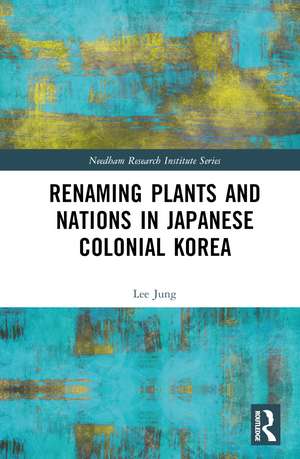Renaming Plants and Nations in Japanese Colonial Korea: Needham Research Institute Series
Autor Jungle E.en Limba Engleză Hardback – 10 apr 2025
The shared aim of botanists who encountered one another in colonial Korea to practise “modern Western botany” is successfully revealed through analysis of their fieldwork and subsequent publications. By exploring the variations in what that term should mean and the politically charged nature of the interactions between both imperial and colonial players, it reveals how botanists of the region created to a form of scientific practice that was neither clearly Western nor particularly modern. It shows how the botany that evolved in this context was a product of colonially resourced, globally connected practice, immersed in intertwined traditions, rather than simply a copy of "modern Western botany”.
Utilizing extensive primary sources, this book will be of interest to students and scholars of the history of science, colonial Korean history and environmental history.
Din seria Needham Research Institute Series
-
 Preț: 327.12 lei
Preț: 327.12 lei -
 Preț: 487.84 lei
Preț: 487.84 lei -
 Preț: 461.66 lei
Preț: 461.66 lei - 18%
 Preț: 1020.69 lei
Preț: 1020.69 lei -
 Preț: 485.07 lei
Preț: 485.07 lei - 22%
 Preț: 324.47 lei
Preț: 324.47 lei -
 Preț: 414.32 lei
Preț: 414.32 lei -
 Preț: 486.42 lei
Preț: 486.42 lei -
 Preț: 480.72 lei
Preț: 480.72 lei -
 Preț: 449.41 lei
Preț: 449.41 lei -
 Preț: 429.41 lei
Preț: 429.41 lei -
 Preț: 465.29 lei
Preț: 465.29 lei - 18%
 Preț: 987.29 lei
Preț: 987.29 lei -
 Preț: 484.47 lei
Preț: 484.47 lei -
 Preț: 389.66 lei
Preț: 389.66 lei -
 Preț: 385.62 lei
Preț: 385.62 lei - 30%
 Preț: 769.06 lei
Preț: 769.06 lei
Preț: 1056.32 lei
Preț vechi: 1288.19 lei
-18% Nou
Puncte Express: 1584
Preț estimativ în valută:
202.13€ • 216.14$ • 168.53£
202.13€ • 216.14$ • 168.53£
Carte nepublicată încă
Doresc să fiu notificat când acest titlu va fi disponibil:
Se trimite...
Preluare comenzi: 021 569.72.76
Specificații
ISBN-13: 9781032836256
ISBN-10: 1032836253
Pagini: 268
Ilustrații: 28
Dimensiuni: 156 x 234 mm
Greutate: 0.5 kg
Ediția:1
Editura: Taylor & Francis
Colecția Routledge
Seria Needham Research Institute Series
Locul publicării:Oxford, United Kingdom
ISBN-10: 1032836253
Pagini: 268
Ilustrații: 28
Dimensiuni: 156 x 234 mm
Greutate: 0.5 kg
Ediția:1
Editura: Taylor & Francis
Colecția Routledge
Seria Needham Research Institute Series
Locul publicării:Oxford, United Kingdom
Public țintă
Postgraduate and Undergraduate AdvancedCuprins
Introduction 1. European Botany Made in Japan 2. Japanese Botany Made in Korea 3. Unsettling Imperial Universality 4. Civilizing Ourselves 5. Becoming Japanese through Collaboration 6. Imperial Transformation of Traditions 7. Confined to Imperial Privilege 8. Liberating through Provincial Botany Conclusion. Moving beyond Mistaken Names for Connected Provincial Tasks
Notă biografică
Jung Lee is an assistant professor at the Institute for the Humanities at Ewha Womans University in Seoul, South Korea.
Recenzii
“How Japanese is cherry blossom? Jung Lee’s vivid and subtle tale of interdependence and rivalry between botanists in Japan and Korea is an outstanding contribution both to the transnational history of modern science, and to our understanding of the dynamics of imperialism and nationalism.”
Francesca Bray, University of Edinburgh, UK
“One of the most important books on modern East Asian science in recent years. Renaming Plants and Nations is an impressive examination of the entanglement of science (particularly botany), Japanese imperialism/colonialism, and Korean nationalism. The book also provides a fascinating case study in the global history of science. A must-read.”
Fa-ti Fan, Binghamton University, USA
“This book makes an incisive analysis of how the mundane yet connected multi-local practices of classifying and naming plants, such as Japanese cherry and rose of Sharon, in Japanese colonial Korea (1910-1945) simultaneously shaped Korean and Japanese botany while also changing "Western" principles and practices of botany.”
Geun Bae Kim, Jeonbuk National University, South Korea
“This book provides a new view of the global history of botany from the local perspective of botanists in East Asia under Japanese imperialism. Lee sheds light on forgotten botanists, both colonizers and colonized, who tried their own practices under colonial culture and politics.”
Akihisa Setoguchi, Kyoto University, Japan
Francesca Bray, University of Edinburgh, UK
“One of the most important books on modern East Asian science in recent years. Renaming Plants and Nations is an impressive examination of the entanglement of science (particularly botany), Japanese imperialism/colonialism, and Korean nationalism. The book also provides a fascinating case study in the global history of science. A must-read.”
Fa-ti Fan, Binghamton University, USA
“This book makes an incisive analysis of how the mundane yet connected multi-local practices of classifying and naming plants, such as Japanese cherry and rose of Sharon, in Japanese colonial Korea (1910-1945) simultaneously shaped Korean and Japanese botany while also changing "Western" principles and practices of botany.”
Geun Bae Kim, Jeonbuk National University, South Korea
“This book provides a new view of the global history of botany from the local perspective of botanists in East Asia under Japanese imperialism. Lee sheds light on forgotten botanists, both colonizers and colonized, who tried their own practices under colonial culture and politics.”
Akihisa Setoguchi, Kyoto University, Japan
Descriere
This book studies a striking example of intensely negotiated colonial scientific practice: the case of botanical practice in Korea during the Japanese colonisation from 1910 to 1945.
